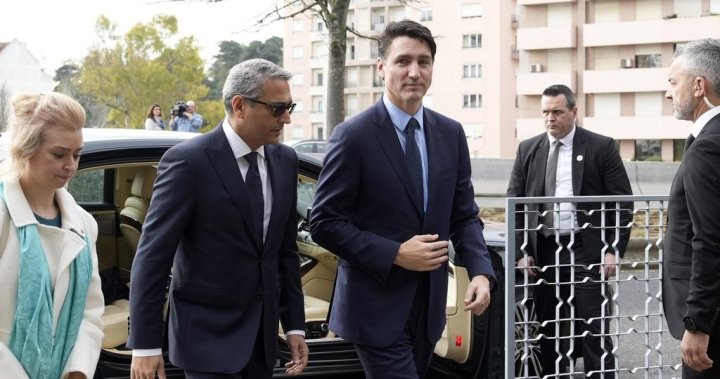Harnessing Clean Energy for AI: A G7 Priority
Prime Minister Justin Trudeau has highlighted the development of clean energy to power artificial intelligence (AI) as a top priority for the G7 this year, as Canada takes on the presidency of the group. Speaking in Paris at a roundtable event ahead of a global AI summit, Trudeau emphasized the importance of ensuring that the energy needed to fuel AI systems does not undermine global efforts to combat climate change. He underscored the need for reliable and clean energy sources, with nuclear energy playing a central role in this effort. Trudeau noted that while building the necessary infrastructure to support AI development is crucial, equal attention must be paid to reducing the energy demand of AI systems, which currently require significant computational power and electricity.
At a separate event with French President Emmanuel Macron, Trudeau reiterated the urgency of addressing how AI will be powered in a way that aligns with global climate goals. He stressed that the world must act decisively to ensure that the growth of AI does not backtrack progress in reducing carbon emissions. This dual focus on energy production and efficiency reflects Canada’s commitment to balancing innovation with sustainability as it assumes a leadership role within the G7.
Ensuring Equitable Access to AI Benefits
Trudeau also called for global equity in the adoption and benefits of AI, drawing parallels to the historical development of electricity. While electricity revolutionized society, many parts of the world still lack access to this basic necessity. The Prime Minister warned that a similar delay in AI adoption could have catastrophic consequences, exacerbating divisions and conflicts between nations. He emphasized the need for inclusive policies and international cooperation to ensure that all countries can benefit from AI advancements, rather than seeing the technology deepen existing inequalities.
Canada’s role in promoting equitable access to AI aligns with its historical leadership in AI governance. For instance, the 2017 Montreal Declaration on Responsible AI and the 2020 Global Partnership on Artificial Intelligence (GPAI), co-founded with France, demonstrate Canada’s commitment to fostering ethical and inclusive AI development. These initiatives have laid the groundwork for the country to play a key role in shaping global AI policies, particularly as the technology becomes more pervasive and impactful.
The Global Governance of AI
The AI Action Summit in Paris, attended by nearly 100 heads of state and government as well as thousands of civil society stakeholders, provides an opportunity for global leaders to address the challenges and opportunities posed by AI. Co-chaired by Indian Prime Minister Narendra Modi and French President Emmanuel Macron, the summit reflects a broad focus on AI’s impact on public interest, the future of work, innovation, and culture. Trudeau’s participation in the summit, including his speech at a closing ceremony related to the GPAI, highlights Canada’s ongoing efforts to position itself as a leader in AI governance and ethical innovation.
Experts such as Florian Martin-Bariteau of the University of Ottawa have noted that Canada’s academic excellence and policy initiatives in AI provide a strong foundation for influencing global discussions. However, critics have pointed to challenges such as the slow commercialization of AI technologies and delays in passing AI regulation bills. Despite these criticisms, Canada’s commitment to multi-stakeholder collaboration and human-centered AI design continues to resonate on the international stage. The summit also follows previous international meetings on AI safety, including those in Bletchley Park and Seoul, which have set the stage for a coordinated global response to the risks and opportunities of AI.
Addressing the Risks of AI
The rapid advancement of AI, particularly the emergence of generative AI like ChatGPT, has brought new urgency to discussions around AI safety and regulation. A report led by Yoshua Bengio, one of Canada’s leading AI researchers, has called attention to the potential harms of general-purpose AI, including risks such as large-scale labor market disruptions, AI-enabled hacking, and privacy violations. The report, which incorporates input from 96 global experts, serves as a critical resource for policymakers seeking to navigate the complex landscape of AI development.
In response to these risks, world leaders have agreed to establish a network of publicly backed safety institutes to advance research and testing of AI technologies. Canada has joined this effort with the launch of the Canadian Artificial Intelligence Safety Institute, which will focus on issues such as bias, system robustness, and privacy breaches. By collaborating with international partners, the institute aims to build a shared research agenda that addresses the global implications of AI while ensuring that the technology benefits all societies.
A Transformative Moment for Canada and the World
Trudeau’s involvement in the AI Action Summit underscores Canada’s ambition to play a pivotal role in shaping the future of AI. As a recognized leader in AI research and governance, Canada has the opportunity to influence global policies and practices that prioritize ethical innovation and equitable access. However, challenges remain, including the need for faster commercialization of AI technologies and more robust regulatory frameworks.
The outcomes of the Paris summit, including potential joint statements on AI safety and governance, are expected to set a roadmap for global action. Canada’s participation in these efforts is not just about advancing its own interests but also about contributing to a collective future where AI serves as a force for good. By balancing innovation with responsibility, Canada and its G7 partners can help ensure that the benefits of AI are shared by all, while mitigating the risks that this transformative technology poses.












